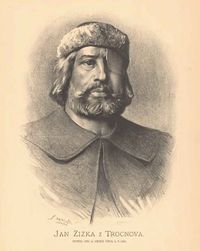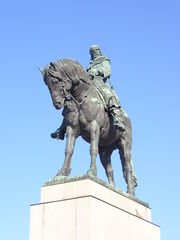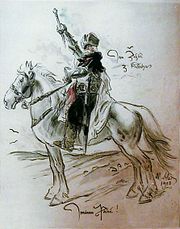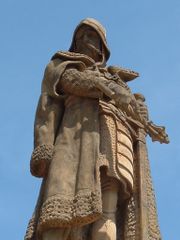Jan Žižka

Jan Žižka z Trocnova a Kalicha (English: John Zizka of Trocnov, German: Johann Ziska or Johann Schischka) (c. 1360 – 1424), Czech general and Hussite leader, follower of Jan Hus, was born at Trocnov (now a part of Borovany) in Bohemia, into a gentried family.
Life
He took part in the civil wars in Bohemia in the reign of Wenceslaus IV. Legal records from 1378 mention Jan Žižka z Trocnova, hinting that if the nick-name žižka meant one-eye, early chronologer Aeneus Sylvius Piccolomini, Pius II was correct in stating the loss of the eye was the result of a childhood fight. Žižka fought in the Battle of Grunwald (July 15, 1410), where he defended Radzyń against the German Knights. He was attached to the court from his youth and held the office of Chamberlain to Queen Sophia.

As the first Reformation began in Bohemia, it culminated in the burning of Jan Hus as a heretic by the Council of Constance in 1415. As Crusades were launched by Catholic forces against Bohemia, Žižka was compelled to defend the Kingdom. He was a pragmatist in developing his military strategy. His army consisted of farmers and peasants. Lacking both the funds and equipment to turn these men into classic soldiers with sword, horse and armor, he used their farmers' skills to boost their military value. He adapted the tools of agriculture into the tools of war. The agricultural flail was transformed into the flail. Farm wagons were used in an ingenious tactic called the Wagenburg. The wagons were parked wheel-to-wheel forming a circle, much like the Pioneers of the Old West formed with their Conestoga Wagons. The horses and soldiers were kept safely inside the enclosure. The outlying side of the wagon and the undercarriage were armored with thick wooden planks, with holes through which soldiers could shoot pistols and crossbows. Gaps between wagons were covered by pavises or housed small cannons, which marked the first ever use of artillery in field operations. At a signal, wagons could be pulled apart and the Hussite cavalry could ride out to fight the enemy in a surprise flanking attack. Žižka trained his troops to perform these manoeuvers and set up a system of flags to signal directions to others in the field.
The Hussite wars also marked the earliest successful use of pistols on the battlefield. The Czechs called the handgun a píštala, and anti-infantry field guns houfnice, from which the English words "pistol" and "howitzer" have been derived. The Germans had just started corning gunpowder, making it suitable for use in smaller, tactical weapons. A gunman on an open field armed with only a single-shot weapon was no match for a charging knight on a horseback; however, from behind a castle wall, or from within the enclosure of the wagenburg, massed and disciplined gunmen could use the handgun to its greatest potential. From his experiences at Grunwald, Žižka knew exactly how his enemies would attack, and he found new ways to defeat forces numerically superior to his own. He is considered to be among the greatest military leaders and innovators of all time. Žižka is one of the few commanders in history who never lost a battle.

Žižka's name first became prominent during the Hussite Wars which began in 1419, with the First Defenestration of Prague, when protesting Hussites threw the town councillors from the windows of the New Town Hall. This led to the armed conflict in which Žižka would earn his fame. When a temporary armistice was concluded between the partisans of King Sigismund and the citizens of Prague, Žižka marched to Plzeň, one of the richest city of the kingdom, with his followers, but soon left and, after defeating the partisans of Sigismund at Sudoměř (March 23, 1420), arrived at Tábor, the then-recently founded stronghold of the Hussite movement.
Žižka took a large part in the organization of the new military community and became one of the four captains of the people (hejtman) who were at its head. Meanwhile Sigismund, king of Germany and Hungary, invaded Bohemia, claiming the crown as the heir of his brother Wenceslaus. Menaced by Sigismund, the citizens of Prague entreated the Taborites for assistance. Led by Žižka and their other captains, the Taborites set out to take part in the defence of the capital. At Prague, Žižka and his men took up a strong position on the hill just outside the city known as the Vítkov, now in Žižkov, a district of Prague named after the battle in his honour. At the end of June 1420 the siege of the city began, and on July 14 the armies of Sigismund made a general attack. A strong German Crusader-led force assaulted the position on the Vítkov, the stronghold that secured the Hussite communications with the open country. Thanks to Žižka's personal leadership, the attack was thrown back and the forces of Sigismund abandoned the siege. A monument was erected on the top of this hill to honor Jan Žižka (The statue has Žižka sitting on the largest horse statue in the world. It is 9 meters or over 27 feet tall.) Shortly afterwards (August 22, 1420) the Taborites left Prague and returned to Tábor.
Žižka now engaged in constant warfare with the partisans of Sigismund, particularly with the powerful Romanist, Oldřich II of Rožmberk. Through this struggle, the Hussites obtained possession of the greater part of Bohemia from Sigismund. It was proposed to elect the Grand Duke of Lithuania Vytautas to the throne. However, the estates of Bohemia and Moravia, who met at Čáslav on June 1, 1421, decided to appoint a provisional government, consisting of twenty members chosen from all the political and religious parties of the country. Žižka, who took part in the deliberations at Čáslav, was elected as one of the two representatives of Tábor.
Žižka summarily suppressed some disturbances on the part of a fanatical sect called the Adamites.
He continued his campaigns against the Romanists and the adherents of Sigismund, and having captured and rebuilt a small castle near Litoměřice (Leitmeritz) he retained possession of it, the only reward for his great services that he ever received or claimed. According to the Hussite custom he gave the biblical name of Chalice (Kalich in Czech) to this new possession, and henceforth adopted the signature of Žižka of the Chalice. Jan Žižka didn´t capture more estates during hussite wars. This fact wasn´t usual at this time and made huge difference between Žižka and his contemporaries.
Later, in 1421, he was severely wounded while besieging the castle of Rábí, and lost the use of his remaining eye. Though now totally blind, he continued to command the armies of Tábor.

At the end of 1421, Sigismund, again attempting to subdue Bohemia, obtained possession of the important town of Kutná Hora. The mainly German citizens of the city killed a few of the Hussites in town and closed the doors of the city to Žižka, whose armies were camped outside the city walls. Žižka, who was at the head of the united armies of Tábor and Prague, was trapped but managed to execute what some historians call the first mobile artillery manoeuver in history. Žižka broke through the enemy lines and retreated to Kolín, but having received reinforcements he attacked and defeated Sigismund's unsuspecting army at the village of Nebovidy between Kolín and Kutná Hora (January 6, 1422). Sigismund lost 12,000 men and only escaped himself by rapid flight. Sigismund's forces made a last stand at Německý Brod (Deutschbrod) on the 10th of January, but the city was stormed by the Czechs, and contrary to Žižka's orders, its defenders were put to the sword.
Early in 1423, internal dissent among the Hussites led to civil war. Žižka, as leader of the Taborites, defeated the men of Prague and the Utraquist nobles at Hořice on April 20. Shortly afterwards came news that a new crusade against Bohemia was being prepared. This induced the Hussites to conclude an armistice at Konopiště on June 24, 1423. As soon as the crusaders had dispersed, internal dissent broke out anew. During his temporary rule over Bohemia, Prince Sigismund Korybut of Lithuania had appointed Bořek, the lord of Miletínekas, governor of the city of Hradec Králové. Bořek belonged to a moderate Hussite faction, the Utraquist party. After the departure of Sigismund Korybut, the city of Hradec Králové refused to recognize Bořek as its ruler, due to the democratic party gaining the upper hand. They called Žižka to its aid. He acceded to the demand and defeated the Utraquists under Bořek at the farm of Strachov, near the city of Hradec Králové (August 4, 1423).
Žižka now attempted to invade Hungary, which was under the rule of his old enemy King Sigismund. Though this Hungarian campaign was unsuccessful owing to the great superiority of the Hungarians, it ranks among the greatest military exploits of Žižka, on account of the skill he displayed in retreat. In 1424, civil war having again broken out in Bohemia, Žižka decisively defeated the Praguers and Utraquist nobles at Skalice on January 6, and at Malešov on June 7. In September he marched on Prague. On the 14th of that month, peace was concluded between the Hussite parties through the influence of John of Rokycan, afterwards Utraquist archbishop of Prague. It was agreed that the now reunited Hussites should attack Moravia, part of which was still held by Sigismund's partisans, and that Žižka should be the leader in this campaign. But he died of the plague at Přibyslav (October 11, 1424) on the Moravian frontier. According to chronicler Piccolomini, Žižka's dying wish was to have his skin used to make drums so that he might continue to lead his troops even after death. Žižka was so well regarded that when he died, his soldiers called themselves the Orphans because they felt like they had lost their father.
His enemies said that "The one whom no mortal hand could destroy was extinguished by the finger of God".
Žižka's tactics were unorthodox and innovative: In addition to training and equipping his army according to their abilities, he used armored wagons armed with small cannons and muskets, presaging the tank of five hundred years later. He was also a master at using geography to full advantage as well as managing the discipline of his troops.
Originally based on an article from the 1911 Encyclopedia Britannica (public domain).
Recent criticism and defence

Recently there have been several speculations on the actual role of Jan Žižka in the development of Czech culture and religion among some historians studying this topic. They argue that Žižka mustn’t be considered only as a brilliant commander fighting for the aim of self-defense and returning the Church nearer to God; we may see him also as a man who – in the name of God – was responsible for killing many people and destroying significant part of a culture by massacring and burning down churches and villages, often sparing only women and children.
This opinion is considered to be very radical, though. The general view is that in response to many official crusades launched at Bohemia from every direction, Žižka had little choice but to stand up and defend his nation and the faith of his countrymen. At a time when mercy from an opponent was not expected, Žižka often offered mercy and enforced it. After the disobedience of his troops at Německý Brod, he ordered his entire army to pray to God for forgiveness for their sins. Thereafter, Žižka authored a document that enforced a strict code of conduct on everyone in his armies, himself included.
Jan Žižka, the man of the sword, may be considered the opposite side of the coin of Jan Hus, the man of God. In Otakar Vávra's film trilogy on the Hussite Revolution shot in the 1950s, Zdeněk Štěpánek played both Hus and Žižka, reflecting the two sides of the Hussite movement. The two men are permanently linked in the Czech national consciousness.
References
- "The Hussite Wars", Count Lutzow, J. M. Dent & Sons London, E. P. Dutton & Co. New York 1909
- "John Zizka & the Hussite Revolution", Frederick G. Heymann, Russell & Russell New York 1955, 1969.
- "The Hussite Wars (1419-36)", Stephen Turnbull, Osprey Publishing (ISBN 1841766658)
- "The Crusade Against Heretics in Bohemia, 1418-1437: Sources and Documents for the Hussite Crusades (Crusade Texts in Translation S.)", Dr Fudge.
- "František Šmahel: Die Hussitische Revolution I-III (MGH-Schriften 43/I-III, Hannover, 2002)."
- "Warrior of God: Jan Žižka and the Hussite Revolution", Victor Verney, Frontline Books London 2009 (ISBN 9781848325166)
- "Hádanky naší minulosti 7. Čtyři Janové a bratr Prokop", Jiří Bílek, Euromedia Group Praha 2007 (ISBN 9788024219523), p. 172-173